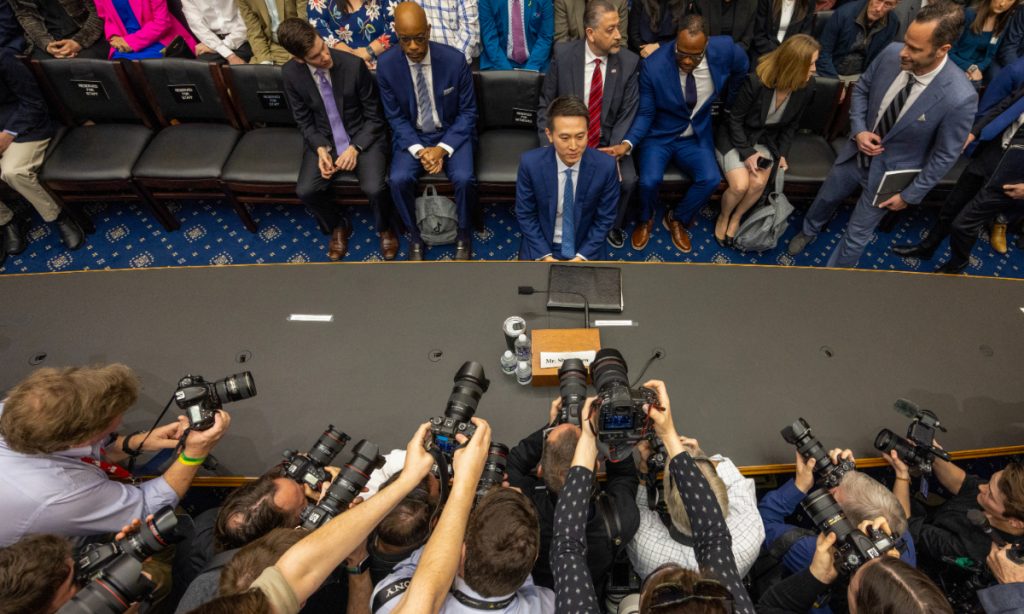US bill forcing ownership change of TikTok another hysterical move in crackdown against Chinese companies

As a US bill that could potentially ban the use of TikTok in the US sailed unanimously through a House committee, Chinese experts said that the act is political gamesmanship by politicians playing the China-bashing card and yet another hysterical move in its crackdown against Chinese companies.
With bilateral ties showing signs of stabilization amid enhanced engagements between the two sides, Chinese analysts warned that the cyber witch hunt against TikTok - used by roughly 170 million Americans - and sheer extortion of a successful company will have negative effects and cause bilateral ties to retract.
The bill, which threatens to ban TikTok from app stores operated by Apple and Google unless the popular short video platform divests itself from ByteDance, its parent company, within about six months, passed unanimously out of the US House energy and commerce committee on Thursday with a vote of 50 to 0.
The bill is set for a floor vote next week.
US media outlet CNN described the bill as the "most aggressive legislation" targeting TikTok to come out of a congressional committee since company CEO Shou Zi Chew testified to lawmakers last year that the app poses no threat to Americans in a grueling hearing.
Chinese observers said the passing of the TikTok bill demonstrated a persistent campaign by some US politicians to hunt down the social media platform, which has enjoyed worldwide success, and is set to dent stabilizing ties between the two countries. Cooperation is the only sensible way forward in the field of science and technology, they noted.
"Some people in the US want to relate TikTok with China, threatening to impose further bans on the company. In the US presidential election year, some lawmakers aim to be tough on China regarding the sensitive and significant issue of TikTok, in order to demonstrate their commitment to so-called national security threats," Song Guoyou, deputy director of the Center for American Studies, Fudan University, told the Global Times.
Although the bill has only been passed within a committee of lawmakers and needs to go further through the legal pipeline, it nonetheless reflects a bipartisan consensus among some politicians in the US on this issue, Song said, noting that whether the bill can gain more support through legislative procedures needs to be watched closely.
"The bill demonstrated the obstinate political prejudice held by some US politicians against the influential platform," Li Yong, a senior research fellow from the China Association of International Trade, told the Global Times on Friday.
Last year, a federal judge temporarily blocked a statewide ban on TikTok in Montana, citing First Amendment rights.
Unable to provide any evidence, these politicians resorted to baseless fearmongering, Li said, refuting the claims that the app could present an espionage threat, as claimed by US politicians.
Driven by their sinophobic paranoia, some US politicians are pushing for a series of absurd bills, measures and bans on Chinese products or China-related goods.
In addition to the witch hunt against TikTok, which can be dated back to the Trump era, cargo cranes, automobiles and even garlic were among the targets US politicians raised red flags against in recent months.
US Commerce Secretary Gina Raimondo said in a recent interview with US media outlet MSNBC that "cars these days are like an iPhone on wheels… Imagine a world with 3 million Chinese vehicles on the roads of America, and Beijing can turn them off at the same time."
In a rebuttal to these false narratives, Hua Chunying, China's Foreign Ministry spokesperson, asked, "Were you suggesting that iPhones, Tesla and even Boeing… have been sending secret data back to the US and could be shut down at any time by Washington?"
Expressing their disagreement with the bill, TikTok users in the US are flooding the congress will telephone calls, with some staffers saying there are as many as 20 calls per minute, according to a report by The Guardian on Friday.
US social organizations such as the American Civil Liberties Union have slammed the bill as "unconstitutional." The Computer and Communications Industry Association, a major trade group representing tech powerhouses including Apple and Google, was also against it.
The move came amid enhanced engagements between Chinese and US officials and business organizations pointing to stabilizing ties, which help alleviate growing concerns among businesses and governments around the world.
The US and China have reportedly agreed to extend a science and technology agreement for another six months.
Chinese analysts said the two countries stand to benefit from cooperation on science and technology, and the ruthless crackdown on Chinese companies can only serve to undermine trust and damage stabilizing bilateral ties.
The renewal of the US-China Science, Tech Pact will be a test of how willing the Biden administration truly is to consider mutual interests, listen to the scientific community's voice and jointly maintain the stability of China-US relations, Song said.
A TikTok spokesperson told the Global Times on Wednesday that "this bill is an outright ban of TikTok, no matter how much the authors try to disguise it. This legislation will trample on the First Amendment rights of 170 million Americans and deprive 5 million small businesses of a platform they rely on to grow and create jobs."
Chinese Foreign Ministry spokesperson Mao Ning said on Friday that China believes ties with the US are not a zero-sum game and is opposed to defining ties by competition.